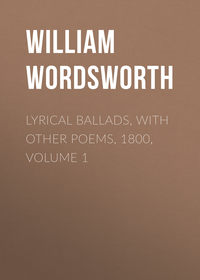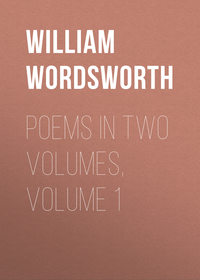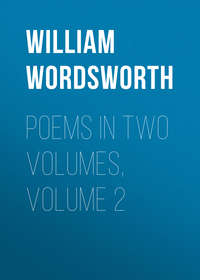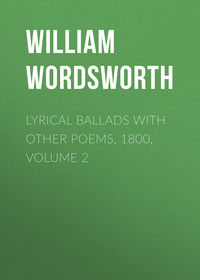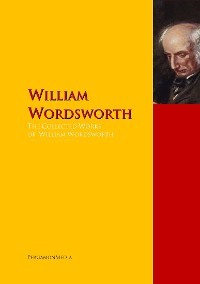Lyrical Ballads, With a Few Other Poems (1798)
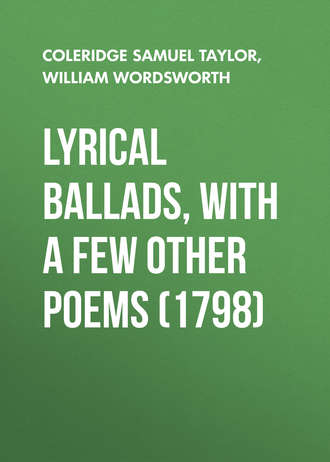 полная версия
полная версияLyrical Ballads, With a Few Other Poems (1798)
Жанр: зарубежная поэзиязарубежная классикастихи и поэзиялитература 19 векалитература 18 векасерьезное чтениеcтихи, поэзия
Язык: Английский
Год издания: 2017
Добавлена:
Настройки чтения
Размер шрифта
Высота строк
Поля
LINES WRITTEN AT A SMALL DISTANCE FROM MY HOUSE, AND SENT BY MY LITTLE BOY TO THE PERSON TO WHOM THEY ARE ADDRESSED
It is the first mild day of March:Each minute sweeter than before,The red-breast sings from the tall larchThat stands beside our door.There is a blessing in the air,Which seems a sense of joy to yieldTo the bare trees, and mountains bare,And grass in the green field.My Sister! ('tis a wish of mine)Now that our morning meal is done,Make haste, your morning task resign;Come forth and feel the sun.Edward will come with you, and pray,Put on with speed your woodland dress,And bring no book, for this one dayWe'll give to idleness.No joyless forms shall regulateOur living Calendar:We from to-day, my friend, will dateThe opening of the year.Love, now an universal birth.From heart to heart is stealing,From earth to man, from man to earth,– It is the hour of feeling.One moment now may give us moreThan fifty years of reason;Our minds shall drink at every poreThe spirit of the season.Some silent laws our hearts may make,Which they shall long obey;We for the year to come may takeOur temper from to-day.And from the blessed power that rollsAbout, below, above;We'll frame the measure of our souls,They shall be tuned to love.Then come, my sister! come, I pray,With speed put on your woodland dress,And bring no book; for this one dayWe'll give to idleness.SIMON LEE, THE OLD HUNTSMAN, WITH AN INCIDENT IN WHICH HE WAS CONCERNED
In the sweet shire of Cardigan,Not far from pleasant Ivor-hall,An old man dwells, a little man,I've heard he once was tall.Of years he has upon his back,No doubt, a burthen weighty;He says he is three score and ten,But others say he's eighty.A long blue livery-coat has he,That's fair behind, and fair before;Yet, meet him where you will, you seeAt once that he is poor.Full five and twenty years he livedA running huntsman merry;And, though he has but one eye left,His cheek is like a cherry.No man like him the horn could sound.And no man was so full of glee;To say the least, four counties roundHad heard of Simon Lee;His master's dead, and no one nowDwells in the hall of Ivor;Men, dogs, and horses, all are dead;He is the sole survivor.His hunting feats have him bereftOf his right eye, as you may see:And then, what limbs those feats have leftTo poor old Simon Lee!He has no son, he has no child,His wife, an aged woman,Lives with him, near the waterfall,Upon the village common.And he is lean and he is sick,His little body's half awryHis ancles they are swoln and thickHis legs are thin and dry.When he was young he little knewOf husbandry or tillage;And now he's forced to work, though weak,– The weakest in the village.He all the country could outrun,Could leave both man and horse behind;And often, ere the race was done,He reeled and was stone-blind.And still there's something in the worldAt which his heart rejoices;For when the chiming hounds are out,He dearly loves their voices!Old Ruth works out of doors with him,And does what Simon cannot do;For she, not over stout of limb,Is stouter of the two.And though you with your utmost skillFrom labour could not wean them,Alas! 'tis very little, allWhich they can do between them.Beside their moss-grown hut of clay,Not twenty paces from the door,A scrap of land they have, but theyAre poorest of the poor.This scrap of land he from the heathEnclosed when he was stronger;But what avails the land to them,Which they can till no longer?Few months of life has he in store,As he to you will tell,For still, the more he works, the moreHis poor old ancles swell.My gentle reader, I perceiveHow patiently you've waited,And I'm afraid that you expectSome tale will be related.O reader! had you in your mindSuch stores as silent thought can bring,O gentle reader! you would findA tale in every thing.What more I have to say is short,I hope you'll kindly take it;It is no tale; but should you think,Perhaps a tale you'll make it.One summer-day I chanced to seeThis old man doing all he couldAbout the root of an old tree,A stump of rotten wood.The mattock totter'd in his hand;So vain was his endeavourThat at the root of the old treeHe might have worked for ever."You're overtasked, good Simon Lee,Give me your tool" to him I said;And at the word right gladly heReceived my proffer'd aid.I struck, and with a single blowThe tangled root I sever'd,At which the poor old man so longAnd vainly had endeavour'd.The tears into his eyes were brought,And thanks and praises seemed to runSo fast out of his heart, I thoughtThey never would have done.– I've heard of hearts unkind, kind deedsWith coldness still returning.Alas! the gratitude of menHas oftner left me mourning.ANECDOTE FOR FATHERS SHEWING HOW THE ART OF LYING MAY BE TAUGHT
I have a boy of five years old,His face is fair and fresh to see;His limbs are cast in beauty's mould,And dearly he loves me.One morn we stroll'd on our dry walk,Our quiet house all full in view,And held such intermitted talkAs we are wont to do.My thoughts on former pleasures ran;I thought of Kilve's delightful shore,My pleasant home, when spring began,A long, long year before.A day it was when I could bearTo think, and think, and think again;With so much happiness to spare,I could not feel a pain.My boy was by my side, so slimAnd graceful in his rustic dress!And oftentimes I talked to him,In very idleness.The young lambs ran a pretty race;The morning sun shone bright and warm;"Kilve," said I, "was a pleasant place,"And so is Liswyn farm."My little boy, which like you more,"I said and took him by the arm —"Our home by Kilve's delightful shore,"Or here at Liswyn farm?""And tell me, had you rather be,"I said and held him by the arm,"At Kilve's smooth shore by the green sea,"Or here at Liswyn farm?"In careless mood he looked at me,While still I held him by the arm,And said, "At Kilve I'd rather be"Than here at Liswyn farm.""Now, little Edward, say why so;My little Edward, tell me why;""I cannot tell, I do not know,""Why this is strange," said I."For, here are woods and green-hills warm;"There surely must some reason be"Why you would change sweet Liswyn farm"For Kilve by the green sea."At this, my boy, so fair and slim,Hung down his head, nor made reply;And five times did I say to him,"Why? Edward, tell me why?"His head he raised – there was in sight,It caught his eye, he saw it plain —Upon the house-top, glittering bright,A broad and gilded vane.Then did the boy his tongue unlock,And thus to me he made reply;"At Kilve there was no weather-cock,"And that's the reason why."Oh dearest, dearest boy! my heartFor better lore would seldom yearn,Could I but teach the hundredth partOf what from thee I learn.WE ARE SEVEN
A simple child, dear brother Jim,That lightly draws its breath,And feels its life in every limb,What should it know of death?I met a little cottage girl,She was eight years old, she said;Her hair was thick with many a curlThat cluster'd round her head.She had a rustic, woodland air,And she was wildly clad;Her eyes were fair, and very fair,– Her beauty made me glad."Sisters and brothers, little maid,"How many may you be?""How many? seven in all," she said,And wondering looked at me."And where are they, I pray you tell?"She answered, "Seven are we,"And two of us at Conway dwell,"And two are gone to sea."Two of us in the church-yard lie,"My sister and my brother,"And in the church-yard cottage, I"Dwell near them with my mother.""You say that two at Conway dwell,"And two are gone to sea,"Yet you are seven; I pray you tell"Sweet Maid, how this may be?"Then did the little Maid reply,"Seven boys and girls are we;"Two of us in the church-yard lie,"Beneath the church-yard tree.""You run about, my little maid,"Your limbs they are alive;"If two are in the church-yard laid,"Then ye are only five.""Their graves are green, they may be seen,"The little Maid replied,"Twelve steps or more from my mother's door,"And they are side by side."My stockings there I often knit,"My 'kerchief there I hem;"And there upon the ground I sit —"I sit and sing to them."And often after sunset, Sir,"When it is light and fair,"I take my little porringer,"And eat my supper there."The first that died was little Jane;"In bed she moaning lay,"Till God released her of her pain,"And then she went away."So in the church-yard she was laid,"And all the summer dry,"Together round her grave we played,"My brother John and I."And when the ground was white with snow,"And I could run and slide,"My brother John was forced to go,"And he lies by her side.""How many are you then," said I,"If they two are in Heaven?"The little Maiden did reply,"O Master! we are seven.""But they are dead; those two are dead!"Their spirits are in heaven!"'Twas throwing words away; for stillThe little Maid would have her will,And said, "Nay, we are seven!"LINES WRITTEN IN EARLY SPRING
I heard a thousand blended notes,While in a grove I sate reclined,In that sweet mood when pleasant thoughtsBring sad thoughts to the mind.To her fair works did nature linkThe human soul that through me ran;And much it griev'd my heart to thinkWhat man has made of man.Through primrose-tufts, in that sweet bower,The periwinkle trail'd its wreathes;And 'tis my faith that every flowerEnjoys the air it breathes.The birds around me hopp'd and play'd:Their thoughts I cannot measure,But the least motion which they made,It seem'd a thrill of pleasure.The budding twigs spread out their fan,To catch the breezy air;And I must think, do all I can,That there was pleasure there.If I these thoughts may not prevent,If such be of my creed the plan,Have I not reason to lamentWhat man has made of man?THE THORN
I
There is a thorn; it looks so old,In truth you'd find it hard to say,How it could ever have been young,It looks so old and grey.Not higher than a two-years' child,It stands erect this aged thorn;No leaves it has, no thorny points;It is a mass of knotted joints,A wretched thing forlorn.It stands erect, and like a stoneWith lichens it is overgrown.II
Like rock or stone, it is o'ergrownWith lichens to the very top,And hung with heavy tufts of moss,A melancholy crop:Up from the earth these mosses creep,And this poor thorn they clasp it roundSo close, you'd say that they were bentWith plain and manifest intent,To drag it to the ground;And all had joined in one endeavourTo bury this poor thorn for ever.III
High on a mountain's highest ridge,Where oft the stormy winter galeCuts like a scythe, while through the cloudsIt sweeps from vale to vale;Not five yards from the mountain-path,This thorn you on your left espy;And to the left, three yards beyond,You see a little muddy pondOf water, never dry;I've measured it from side to side:'Tis three feet long, and two feet wide.IV
And close beside this aged thorn,There is a fresh and lovely sight,A beauteous heap, a hill of moss,Just half a foot in height.All lovely colours there you see,All colours that were ever seen,And mossy network too is there,As if by hand of lady fairThe work had woven been,And cups, the darlings of the eye,So deep is their vermilion dye.V
Ah me! what lovely tints are there!Of olive-green and scarlet bright,In spikes, in branches, and in stars,Green, red, and pearly white.This heap of earth o'ergrown with mossWhich close beside the thorn you see,So fresh in all its beauteous dyes,Is like an infant's grave in sizeAs like as like can be:But never, never any where,An infant's grave was half so fair.VI
Now would you see this aged thorn,This pond and beauteous hill of moss,You must take care and chuse your timeThe mountain when to cross.For oft there sits, between the heapThat's like an infant's grave in size,And that same pond of which I spoke,A woman in a scarlet cloak,And to herself she cries,"Oh misery! oh misery!"Oh woe is me! oh misery!"VII
At all times of the day and nightThis wretched woman thither goes,And she is known to every star,And every wind that blows;And there beside the thorn she sitsWhen the blue day-light's in the skies,And when the whirlwind's on the hill,Or frosty air is keen and still,And to herself she cries,"Oh misery! oh misery!"Oh woe is me! oh misery!"VIII
"Now wherefore thus, by day and night,"In rain, in tempest, and in snow,"Thus to the dreary mountain-top"Does this poor woman go?"And why sits she beside the thorn"When the blue day-light's in the sky,"Or when the whirlwind's on the hill,"Or frosty air is keen and still,"And wherefore does she cry? —"Oh wherefore? wherefore? tell me why"Does she repeat that doleful cry?"IX
I cannot tell; I wish I could;For the true reason no one knows,But if you'd gladly view the spot,The spot to which she goes;The heap that's like an infant's grave,The pond – and thorn, so old and grey,Pass by her door – 'tis seldom shut —And if you see her in her hut,Then to the spot away! —I never heard of such as dareApproach the spot when she is there.X
"But wherefore to the mountain-top"Can this unhappy woman go,"Whatever star is in the skies,"Whatever wind may blow?"Nay rack your brain – 'tis all in vain,I'll tell you every thing I know;But to the thorn, and to the pondWhich is a little step beyond,I wish that you would go:Perhaps when you are at the placeYou something of her tale may trace.XI
I'll give you the best help I can:Before you up the mountain go,Up to the dreary mountain-top,I'll tell you all I know.Tis now some two and twenty years,Since she (her name is Martha Ray)Gave with a maiden's true good willHer company to Stephen Hill;And she was blithe and gay,And she was happy, happy stillWhene'er she thought of Stephen Hill.XII
And they had fix'd the wedding-day,The morning that must wed them both;But Stephen to another maidHad sworn another oath;And with this other maid to churchUnthinking Stephen went —Poor Martha! on that woful dayA cruel, cruel fire, they say,Into her bones was sent:It dried her body like a cinder,And almost turn'd her brain to tinder.XIII
They say, full six months after this,While yet the summer-leaves were green,She to the mountain-top would go,And there was often seen.'Tis said, a child was in her womb,As now to any eye was plain;She was with child, and she was mad,Yet often she was sober sadFrom her exceeding pain.Oh me! ten thousand times I'd ratherThat he had died, that cruel father!XIV
Sad case for such a brain to holdCommunion with a stirring child!Sad case, as you may think, for oneWho had a brain so wild!Last Christmas when we talked of this,Old Farmer Simpson did maintain,That in her womb the infant wroughtAbout its mother's heart, and broughtHer senses back again:And when at last her time drew near,Her looks were calm, her senses clear.XV
No more I know, I wish I did,And I would tell it all to you;For what became of this poor childThere's none that ever knew:And if a child was born or no,There's no one that could ever tell;And if 'twas born alive or dead,There's no one knows, as I have said,But some remember well,That Martha Ray about this timeWould up the mountain often climb.XVI
And all that winter, when at nightThe wind blew from the mountain-peak,'Twas worth your while, though in the dark,The church-yard path to seek:For many a time and oft were heardCries coming from the mountain-head,Some plainly living voices were,And others, I've heard many swear,Were voices of the dead:I cannot think, whate'er they say,They had to do with Martha Ray.XVII
But that she goes to this old thorn,The thorn which I've described to you,And there sits in a scarlet cloak,I will be sworn is true.For one day with my telescope,To view the ocean wide and bright,When to this country first I came,Ere I had heard of Martha's name,I climbed the mountain's height:A storm came on, and I could seeNo object higher than my knee.XVIII
'Twas mist and rain, and storm and rain,No screen, no fence could I discover,And then the wind! in faith, it wasA wind full ten times over.I looked around, I thought I sawA jutting crag, and oft' I ran,Head-foremost, through the driving rain,The shelter of the crag to gain,And, as I am a man,Instead of jutting crag, I foundA woman seated on the ground.XIX
I did not speak – I saw her face,Her face it was enough for me;I turned about and heard her cry,"O misery! O misery!"And there she sits, until the moonThrough half the clear blue sky will go,And when the little breezes makeThe waters of the pond to shake,As all the country know,She shudders and you hear her cry,"Oh misery! oh misery!XX
"But what's the thorn? and what's the pond?"And what's the hill of moss to her?"And what's the creeping breeze that comes"The little pond to stir?"I cannot tell; but some will sayShe hanged her baby on the tree,Some say she drowned it in the pond,Which is a little step beyond,But all and each agree,The little babe was buried there,Beneath that hill of moss so fair.XXI
I've heard the scarlet moss is redWith drops of that poor infant's blood;But kill a new-born infant thus!I do not think she could.Some say, if to the pond you go,And fix on it a steady view,The shadow of a babe you trace,A baby and a baby's face,And that it looks at you;Whene'er you look on it, 'tis plainThe baby looks at you again.XXII
And some had sworn an oath that sheShould be to public justice brought;And for the little infant's bonesWith spades they would have sought.But then the beauteous hill of mossBefore their eyes began to stir;And for full fifty yards around,The grass it shook upon the ground;But all do still averThe little babe is buried there,Beneath that hill of moss so fair.XXIII
I cannot tell how this may be,But plain it is, the thorn is boundWith heavy tufts of moss, that striveTo drag it to the ground.And this I know, full many a time,When she was on the mountain high,By day, and in the silent night,When all the stars shone clear and bright,That I have heard her cry,"Oh misery! oh misery!"O woe is me! oh misery!"THE LAST OF THE FLOCK
In distant countries I have been,And yet I have not often seenA healthy man, a man full grownWeep in the public roads alone.But such a one, on English ground,And in the broad high-way, I met;Along the broad high-way he came,His cheeks with tears were wet.Sturdy he seemed, though he was sad;And in his arms a lamb he had.He saw me, and he turned aside,As if he wished himself to hide:Then with his coat he made essayTo wipe those briny tears away.I follow'd him, and said, "My friend"What ails you? wherefore weep you so?"– "Shame on me, Sir! this lusty lamb,He makes my tears to flow.To-day I fetched him from the rock;He is the last of all my flock.When I was young, a single man.And after youthful follies ran,Though little given to care and thought,Yet, so it was, a ewe I bought;And other sheep from her I raised,As healthy sheep as you might see,And then I married, and was richAs I could wish to be;Of sheep I number'd a full score,And every year encreas'd my store.Year after year my stock it grew,And from this one, this single ewe,Full fifty comely sheep I raised,As sweet a flock as ever grazed!Upon the mountain did they feed;They throve, and we at home did thrive.– This lusty lamb of all my storeIs all that is alive:And now I care not if we die,And perish all of poverty.Ten children, Sir! had I to feed,Hard labour in a time of need!My pride was tamed, and in our grief,I of the parish ask'd relief.They said I was a wealthy man;My sheep upon the mountain fed,And it was fit that thence I tookWhereof to buy us bread:""Do this; how can we give to you,"They cried, "what to the poor is due?"I sold a sheep as they had said,And bought my little children bread,And they were healthy with their food;For me it never did me good.A woeful time it was for me,To see the end of all my gains,The pretty flock which I had rearedWith all my care and pains,To see it melt like snow away!For me it was a woeful day.Another still! and still another!A little lamb, and then its mother!It was a vein that never stopp'd,Like blood-drops from my heart they dropp'd.Till thirty were not left aliveThey dwindled, dwindled, one by one,And I may say that many a timeI wished they all were gone:They dwindled one by one away;For me it was a woeful day.To wicked deeds I was inclined,And wicked fancies cross'd my mind,And every man I chanc'd to see,I thought he knew some ill of meNo peace, no comfort could I find,No ease, within doors or without,And crazily, and wearily,I went my work about.Oft-times I thought to run away;For me it was a woeful day.Sir! 'twas a precious flock to me,As dear as my own children be;For daily with my growing storeI loved my children more and more.Alas! it was an evil time;God cursed me in my sore distress,I prayed, yet every day I thoughtI loved my children less;And every week, and every day,My flock, it seemed to melt away.They dwindled, Sir, sad sight to see!From ten to five, from five to three,A lamb, a weather, and a ewe;And then at last, from three to two;And of my fifty, yesterdayI had but only one,And here it lies upon my arm,Alas! and I have none;To-day I fetched it from the rock;It is the last of all my flock."THE DUNGEON
And this place our forefathers made for man!This is the process of our love and wisdom,To each poor brother who offends against us —Most innocent, perhaps – and what if guilty?Is this the only cure? Merciful God?Each pore and natural outlet shrivell'd upBy ignorance and parching poverty,His energies roll back upon his heart,And stagnate and corrupt; till changed to poison,They break out on him, like a loathsome plague-spot;Then we call in our pamper'd mountebanks —And this is their best cure! uncomfortedAnd friendless solitude, groaning and tears,And savage faces, at the clanking hour,Seen through the steams and vapour of his dungeon,By the lamp's dismal twilight! So he liesCircled with evil, till his very soulUnmoulds its essence, hopelessly deformedBy sights of ever more deformity!With other ministrations thou, O nature!Healest thy wandering and distempered child:Thou pourest on him thy soft influences,Thy sunny hues, fair forms, and breathing sweets,Thy melodies of woods, and winds, and waters,Till he relent, and can no more endureTo be a jarring and a dissonant thing,Amid this general dance and minstrelsy;But, bursting into tears, wins back his way,His angry spirit healed and harmonizedBy the benignant touch of love and beauty.THE MAD MOTHER
Her eyes are wild, her head is bare,The sun has burnt her coal-black hair,Her eye-brows have a rusty stain,And she came far from over the main.She has a baby on her arm,Or else she were alone;And underneath the hay-stack warm,And on the green-wood stone,She talked and sung the woods among;And it was in the English tongue."Sweet babe! they say that I am mad,But nay, my heart is far too glad;And I am happy when I singFull many a sad and doleful thing:Then, lovely baby, do not fear!I pray thee have no fear of me,But, safe as in a cradle, hereMy lovely baby! thou shalt be,To thee I know too much I owe;I cannot work thee any woe.A fire was once within my brain;And in my head a dull, dull pain;And fiendish faces one, two, three,Hung at my breasts, and pulled at me.But then there came a sight of joy;It came at once to do me good;I waked, and saw my little boy,My little boy of flesh and blood;Oh joy for me that sight to see!For he was here, and only he.Suck, little babe, oh suck again!It cools my blood; it cools my brain;Thy lips I feel them, baby! theyDraw from my heart the pain away.Oh! press me with thy little hand;It loosens something at my chest;About that tight and deadly bandI feel thy little fingers press'd.The breeze I see is in the tree;It comes to cool my babe and me.Oh! love me, love me, little boy!Thou art thy mother's only joy;And do not dread the waves below,When o'er the sea-rock's edge we go;The high crag cannot work me harm,Nor leaping torrents when they howl;The babe I carry on my arm,He saves for me my precious soul;Then happy lie, for blest am I;Without me my sweet babe would die.Then do not fear, my boy! for theeBold as a lion I will be;And I will always be thy guide,Through hollow snows and rivers wide.I'll build an Indian bower; I knowThe leaves that make the softest bed:And if from me thou wilt not go,But still be true 'till I am dead,My pretty thing! then thou shalt sing,As merry as the birds in spring.Thy father cares not for my breast,'Tis thine, sweet baby, there to rest:'Tis all thine own! and if its hueBe changed, that was so fair to view,'Tis fair enough for thee, my dove!My beauty, little child, is flown;But thou wilt live with me in love,And what if my poor cheek be brown?'Tis well for me; thou canst not seeHow pale and wan it else would be.Dread not their taunts, my little life!I am thy father's wedded wife;And underneath the spreading treeWe two will live in honesty.If his sweet boy he could forsake,With me he never would have stay'd:From him no harm my babe can take,But he, poor man! is wretched made,And every day we two will prayFor him that's gone and far away.I'll teach my boy the sweetest things;I'll teach him how the owlet sings.My little babe! thy lips are still,And thou hast almost suck'd thy fill.– Where art thou gone my own dear child?What wicked looks are those I see?Alas! alas! that look so wild,It never, never came from me:If thou art mad, my pretty lad,Then I must be for ever sad.Oh! smile on me, my little lamb!For I thy own dear mother am.My love for thee has well been tried:I've sought thy father far and wide.I know the poisons of the shade,I know the earth-nuts fit for food;Then, pretty dear, be not afraid;We'll find thy father in the wood.Now laugh and be gay, to the woods away!And there, my babe; we'll live for aye.

